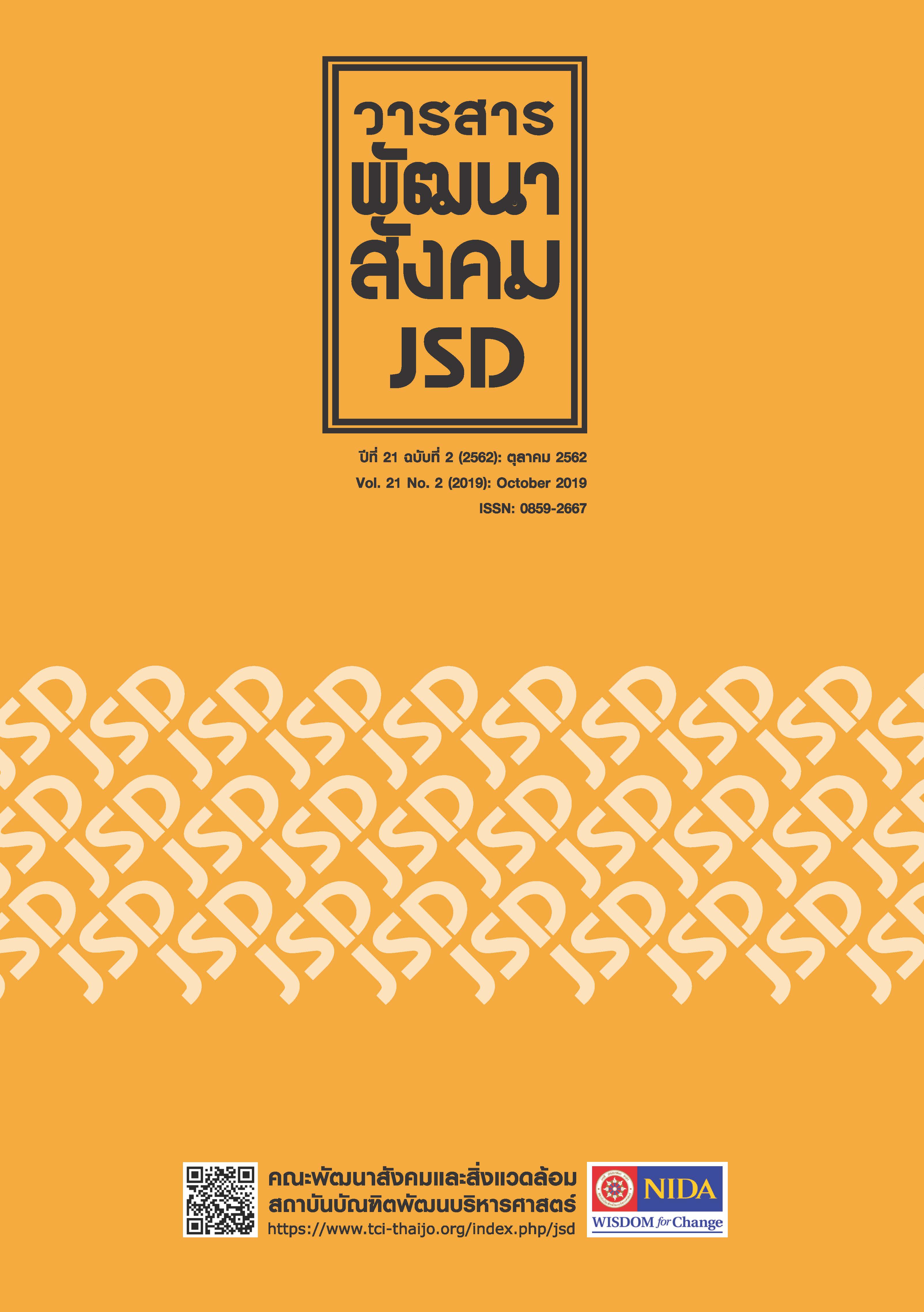Factors Affecting Lifestyle of Young Generation in Thai Rural Society
Main Article Content
Abstract
The purpose of this research aims to study the factors affecting the lifestyle of young
generation in Thai rural society. This research is a quantitative study. Data were collected by
questionnaires from 393 samples who are the young generation or Generation Y (18 to 37 years
old in 2018) and lived in rural areas of Thailand, that were the communities in field- study areas
of graduate volunteer students, batch#49, Thammasat University. The use of statistic to test the
hypothesis was the multiple regression analysis ( Enter Method) . The results showed that the
factors affecting the lifestyle of young generation in Thai rural society consisted of population
factors including age, marital status and education level. Economic factors include income
adequacy. Social and political factors include the membership of a group or organization in the
community, affected by state policy and the impact of modern development. Information
Factors include the use of social media. These variables could predict the lifestyle of young
generation in Thai rural society at 31.5% at the .05 level of significance.
Article Details
References
Journal of Sociology and Anthropology. 33(2), 103-127.
Ativanichayapong, N., Raluk, K. and Sea-Jang, K. (2014). Rural Communities in Thailand from the Perspectives
of Graduate Volunteers, Thammasat University. [in Thai]. Retrieved from
https://www.psds.tu.ac.th/paper/a1.pdf.
Blackwell, R. D. Miniard, P. W. and Engel, J. F. (2012). Customer behavior: Marketing research. 12th ed.
Singapore: Cengage Learning.
Chalermmeeprasert, P. (2007). A Study of the Influence of Radio and Television Media on Thon Khon Yang
People's Lifestyle Changed from Traditional: Kantharawichai district. Maha Sarakhamprovince. [in
Thai]. Bangkok: National Research Council of Thailand.
Cronbach, L. J. (1970). Essential of Psychological Testing. 3rd ed. New York: Harper Row.
Dickey, J. and Sullivan, J. (2007). Generation shift in media habits. Media Week. 17(7): 10.
Evans, M., Jamal, A. and Foxall, G. (2009). Customer behavior. 2nd ed. Chichester: John Winley & Sons.
Hair, F. J., Black, C., W., Babin, J. B. and Anderson, E. R. (2006). Multivariate data analysis. 6th ed. Upper
Saddle River, NJ: Pearson Prentice Hall.
Hawkins, D. I. and Mothersbaugh, D. L. (2013). Customer behavior: building marketing strategy. 12th ed.
New York: McGraw-Hill Irwin.
Himmel, B. (2008). Different strokes for different generations. Rental Product News. 30(7): 42-46.
Hoyer, W. D. and MacInnin, D., J. (2010). Customer behavior. 5th ed. Manson, Ohio: South-Western
Cengage Learning.
Kantha, W. (2008). A Study of The Change in Karen’s Way of Life at Ban Tungloy, 4th Region, Om-Koi
Sub-Disrtict, Om-Koi Distric, Chiang Mai Province. [in Thai]. Nakornpathom: Mahamakut Buddhist
University.
Lynn-Nelson, G. (2007). The next generation of learners. American Association of Law Libraries Spectrum.
11: 8.
Masae, A. and Phaophoo, N. (n.d.). Public Policy and Community Development and Natural Resources
Management in Rural Society. [in Thai] Retrieved from
https://www.cse.nida.ac.th/main/images/PublicPolicy.pdf.
Meier, J. Austin, S. and Corcker, M. (2010). Generation Y in the workforce: managerial challenges. The
Journal of Human Resource and Adult Learning. 6(1), 68-78.
Plummer, J. T. (1974). The Concept and Application of Life Style Segmentation. Journal of marketing.
38(1): 33-37.
Podhisita, C. (2012). Rural Thai villages in capitalism. [in Thai]. The Journal of the Royal Institute of Thailand.
37(4), 163-185.
Ratanavilaisakul, R. and Maliphan, S. (2008). Maintenance and Converting of Life of Lua People Pakhum Village,
Boklua District, Nan Province. [in Thai]. Veridian E – Journal, Silpakorn University. 1(1), 48-55.
Rovinelli, R. and Hambleton, R. K. (1976). On the use of content specialists in the assessment of
criterion-referenced test item validity. Paper presented at the meeting of AERA, San Francisco.
Saksoong, A. (2014). Women in Rural Society: A Historical study on Sathing Phra Peninsula in Songkhla Province,
1961-2007 A.D. [in Thai]. Journal of Humanities and Social Sciences, Thaksin University. 9(1), 1-19.
Sattayanurak, A. (2013). Changes in Thai Rural Society: Democracy on the move. [in Thai]. Bangkok: The Thai
Research Fund.
Schiffman, L. G. and Wisenblit, J. (2015). Customer behavior: Motivation research (Marketing). New York:
Pearson.
Sigman, A. (2009). Well Connected?. The Biological Implications of Social Networking Biologist, 56(1), 15.
Smithikrai, S. (2010). Customer Behavior. [in Thai]. Bangkok: Chulalongkorn University Press.
Solomon, M. R. (2015). Customer behavior: Market survey. 11th ed. Boston: Pearson.
Sumungkalo, P. (2017). Social Change Affecting The Way of Life of Lawa Ethnic Group, Moo 11, Papae Sub-
District, Maesariang District, Maehongson Province. [in Thai]. Journal of Buddhist Studies. 8(2), 57-68.
Terjesen, S. Vinnicombe, S. and Freeman, C. (2006). Attractive generation Y graduates: organizational
attributes, likelihood to apply and sex differences. Career Development International. 12(6),
504-522.
Van Meter, R. A., Grisaffe, D. B. G., Chonko, L. B. and Roberts, J. A. (2012). Generation Y's ethical ideology
and its potential workplace implications. Journal of Business Ethics. 117(1), 93-109.
Yamane, Taro. (1967). Statistics, An Introductory Analysis. 2nd Ed. New York: Harper and Row.


